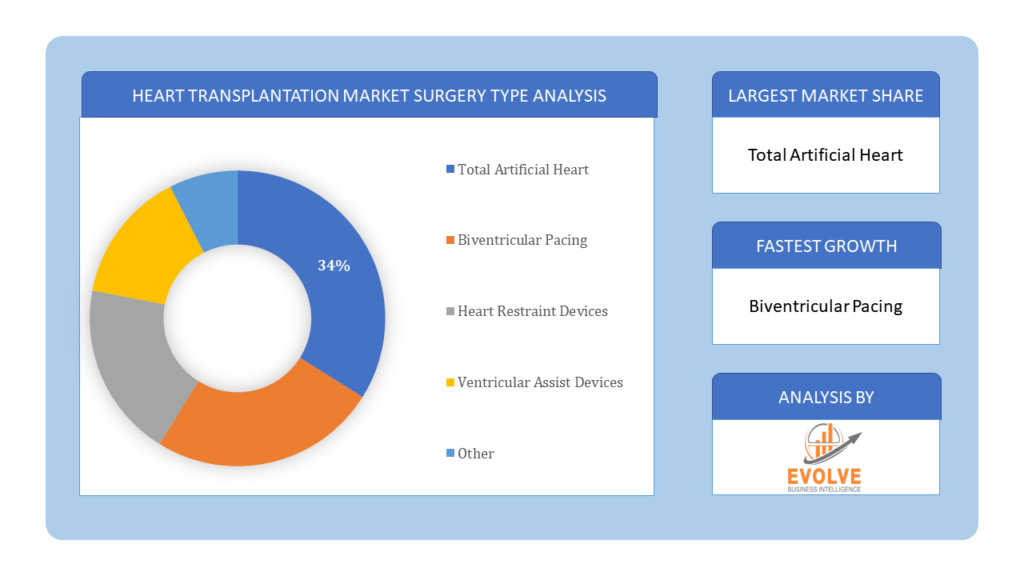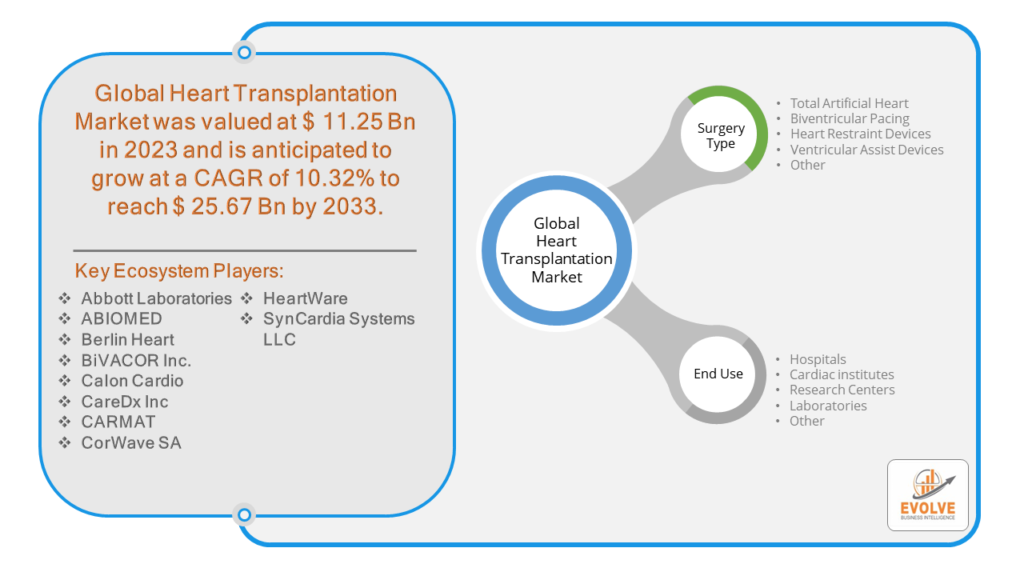Heart Transplantation Market Overview
The Heart Transplantation Market Size is expected to reach USD 25.67 Billion by 2033. The Heart Transplantation Market industry size accounted for USD 11.25 Billion in 2023 and is expected to expand at a compound annual growth rate (CAGR) of 10.32% from 2023 to 2033. The heart transplantation market refers to the sector of healthcare focused on the surgical procedure of replacing a diseased or failing heart with a healthy heart from a donor. This market encompasses various aspects, including medical devices, pharmaceuticals, and healthcare services related to heart transplantation.
Medications are crucial in the process of heart transplantation to prevent organ rejection and manage other post-operative complications. Immunosuppressants, antiviral drugs, and antibiotics are commonly used in this context. Factors influencing the heart transplantation market include advancements in medical technology, increasing prevalence of cardiovascular diseases, improvements in organ procurement and preservation techniques, and expanding healthcare infrastructure. Additionally, factors such as reimbursement policies, organ donation rates, and ethical considerations also impact the dynamics of this market.
Global Heart Transplantation Market Synopsis
The COVID-19 pandemic had a multifaceted impact on the heart transplantation market. During the height of the pandemic, many hospitals faced challenges in performing elective surgeries, including heart transplantations, due to resource constraints, concerns about patient safety, and the need to prioritize COVID-19 cases. This led to a decrease in the number of heart transplantations performed worldwide. The pandemic disrupted organ donation and procurement processes, leading to a decrease in the availability of donor hearts for transplantation. Reduced travel, fewer accidents, and logistical challenges in organ transport contributed to this shortage. The heart transplantation market relies on a complex supply chain for medical devices, pharmaceuticals, and other supplies. Disruptions in manufacturing, transportation, and distribution due to lockdowns and restrictions impacted the availability of these essential products. To reduce the risk of virus transmission, healthcare providers increasingly adopted telemedicine for pre- and post-transplant consultations, follow-up care, and monitoring of transplant recipients. This shift necessitated adjustments in healthcare delivery methods and may have long-term implications for patient care in the heart transplantation market.
Heart Transplantation Market Dynamics
The major factors that have impacted the growth of Heart Transplantation Market are as follows:
Drivers:
Ø Advancements in Transplantation Techniques
Ongoing advancements in surgical techniques, organ preservation methods, immunosuppressive therapies, and post-transplant care have improved the success rates and outcomes of heart transplantation. These advancements encourage more widespread adoption of heart transplantation as a viable treatment option. Innovation in medical devices, including surgical tools, implantable devices such as ventricular assist devices (VADs), and monitoring technologies, enhances the safety and efficacy of heart transplantation procedures. These innovations contribute to better patient outcomes and drive market growth. Increasing healthcare expenditure, particularly in developing countries, enables greater access to heart transplantation services. Expanded healthcare infrastructure, reimbursement policies, and financial support programs facilitate access to transplantation procedures for eligible patients.
Restraint:
- Perception of High Cost of Transplantation
One of the most significant restraints on the heart transplantation market is the persistent shortage of donor organs, particularly hearts. The demand for heart transplantation far exceeds the available supply of donor hearts, leading to long waiting times for patients and potentially limiting the expansion of the market. Heart transplantation is a complex surgical procedure that requires extensive pre- and post-operative care, including lifelong immunosuppressive therapy. The high cost associated with transplantation, including surgical expenses, hospitalization, medications, and follow-up care, can be a barrier to access for some patients, particularly in regions with limited healthcare resources or inadequate insurance coverage.
Opportunity:
⮚ Growing demand for Organ Procurement and Allocation Improvements
Continued innovation in medical devices, surgical techniques, and monitoring technologies presents significant opportunities for improving the safety, efficacy, and accessibility of heart transplantation procedures. Advancements such as minimally invasive surgical approaches, next-generation immunosuppressive therapies, and remote monitoring systems can enhance patient outcomes and expand the market. Initiatives aimed at increasing organ donation rates, optimizing organ allocation algorithms, and improving organ preservation techniques can help address the persistent shortage of donor organs and expand the pool of available hearts for transplantation. Collaborative efforts between healthcare organizations, government agencies, and advocacy groups can facilitate these improvements and create opportunities for market growth. The integration of artificial intelligence (AI) and digital health technologies, such as predictive analytics, telemedicine platforms, and wearable devices, can streamline transplantation workflows, enhance patient monitoring, and improve clinical decision-making. Leveraging these technologies can optimize transplant outcomes, reduce healthcare costs, and create opportunities for market expansion.
Heart Transplantation Market Segment Overview
By Surgery Type
 Based on Surgery Type, the market is segmented based on Total Artificial Heart, Biventricular Pacing, Heart Restraint Devices, Ventricular Assist Devices and Other. Ventricular assisted device segment dominated the global market. A ventricular assist device (VAD) aids in the circulation of blood from the heart’s lower chambers to the body as a whole. It is used to treat heart failure or a weak heart. While the patient is awaiting other therapies, such as a heart transplant, a VAD may be utilised to keep the heart pumping. The heart can occasionally be permanently assisted by a VAD.
Based on Surgery Type, the market is segmented based on Total Artificial Heart, Biventricular Pacing, Heart Restraint Devices, Ventricular Assist Devices and Other. Ventricular assisted device segment dominated the global market. A ventricular assist device (VAD) aids in the circulation of blood from the heart’s lower chambers to the body as a whole. It is used to treat heart failure or a weak heart. While the patient is awaiting other therapies, such as a heart transplant, a VAD may be utilised to keep the heart pumping. The heart can occasionally be permanently assisted by a VAD.
By End Use
Based on End Use, the market has been divided into the Hospitals, Cardiac institutes, Research Centers, Laboratories and Other. Hospitals segment dominated the Heart Transplant Market. The primary reason fueling the growth of this market is the rise in heart transplant surgeries being carried out in hospitals.
Global Heart Transplantation Market Regional Analysis
Based on region, the global Heart Transplantation Market has been divided into North America, Europe, Asia-Pacific, the Middle East & Africa, and Latin America. North America is projected to dominate the use of the Heart Transplantation Market followed by the Asia-Pacific and Europe regions.
 Heart Transplantation North America Market
Heart Transplantation North America Market
North America holds a dominant position in the Heart Transplantation Market. North America, particularly the United States, has a well-established heart transplantation market with advanced healthcare infrastructure, robust organ procurement and transplantation networks, and high levels of organ donation awareness. The region benefits from extensive research and development activities, technological innovations, and supportive regulatory frameworks. However, disparities in access to transplantation services based on socioeconomic factors and insurance coverage exist.
Heart Transplantation Asia-Pacific Market
The Asia-Pacific region has indeed emerged as the fastest-growing market for the Heart Transplantation Market industry. The Asia-Pacific region is experiencing rapid growth in the heart transplantation market, driven by improving healthcare infrastructure, rising prevalence of cardiovascular diseases, and increasing awareness of organ donation. Countries such as India, China, and Japan have established transplantation programs, but access to transplantation services may be limited in some areas due to resource constraints and regulatory challenges.
Competitive Landscape
The global Heart Transplantation Market is highly competitive, with numerous players offering a wide range of software solutions. The competitive landscape is characterized by the presence of established companies, as well as emerging startups and niche players. To increase their market position and attract a wide consumer base, the businesses are employing various strategies, such as product launches, and strategic alliances.
Prominent Players:
- Abbott Laboratories
- ABIOMED
- Berlin Heart
- BiVACOR Inc.
- Calon Cardio
- CareDx Inc
- CARMAT
- CorWave SA
- HeartWare
- SynCardia Systems LLC
Key Development
In January 2022, BioVentrix Acquired MateraCor Inc and its leading product. MateraCor, Inc. uses injectable hydrogel based on alginate to stop the progression of heart failure and reverse it.
In September 2021, SynCardia Systems LLC was acquired by the venture capital investment firm Hunniwell Lake Ventures, LLC, headquartered in California. With this acquisition, SynCardia has now gained the operational and financial means for its continued expansion and success, in both domestic and international markets. The company has been able to continue creating cutting-edge medical devices and exploring new indications owing to this funding.
Scope of the Report
Global Heart Transplantation Market, by Surgery Type
- Total Artificial Heart
- Biventricular Pacing
- Heart Restraint Devices
- Ventricular Assist Devices
- Other
Global Heart Transplantation Market, by End Use
- Hospitals
- Cardiac institutes
- Research Centers
- Laboratories
- Other
Global Heart Transplantation Market, by Region
- North America
- US
- Canada
- Mexico
- Europe
- UK
- Germany
- France
- Italy
- Spain
- Benelux
- Nordic
- Rest of Europe
- Asia Pacific
- China
- Japan
- South Korea
- Indonesia
- Austalia
- Malaysia
- India
- Rest of Asia Pacific
- South America
- Brazil
- Argentina
- Rest of South America
- Middle East & Africa
- Saudi Arabia
- UAE
- Egypt
- South Africa
- Rest of Middle East & Africa
| Parameters | Indicators |
|---|---|
| Market Size | 2033: $25.67 Billion |
| CAGR | 10.32% CAGR (2023-2033) |
| Base year | 2022 |
| Forecast Period | 2023-2033 |
| Historical Data | 2021 |
| Report Coverage | Revenue Forecast, Competitive Landscape, Growth Factors, and Trends |
| Key Segmentations | Surgery Type, End Use |
| Geographies Covered | North America, Europe, Asia-Pacific, Latin America, Middle East, Africa |
| Key Vendors | Abbott Laboratories, ABIOMED, Berlin Heart, BiVACOR Inc., Calon Cardio, CareDx Inc, CARMAT, CorWave SA, HeartWare and SynCardia Systems LLC |
| Key Market Opportunities | • Organ Procurement and Allocation Improvements • Integration of Artificial Intelligence and Digital Health Technologies |
| Key Market Drivers | • Advancements in Transplantation Techniques • Technological Innovations |
REPORT CONTENT BRIEF:
- High-level analysis of the current and future Heart Transplantation Market trends and opportunities
- Detailed analysis of current market drivers, restraining factors, and opportunities in the future
- Heart Transplantation Market historical market size for the year 2021, and forecast from 2023 to 2033
- Heart Transplantation Market share analysis at each product level
- Competitor analysis with detailed insight into its product segment, Government & Defense strength, and strategies adopted.
- Identifies key strategies adopted including product launches and developments, mergers and acquisitions, joint ventures, collaborations, and partnerships as well as funding taken and investment done, among others.
- To identify and understand the various factors involved in the global Heart Transplantation Market affected by the pandemic
- To provide a detailed insight into the major companies operating in the market. The profiling will include the Government & Defense health of the company’s past 2-3 years with segmental and regional revenue breakup, product offering, recent developments, SWOT analysis, and key strategies.





